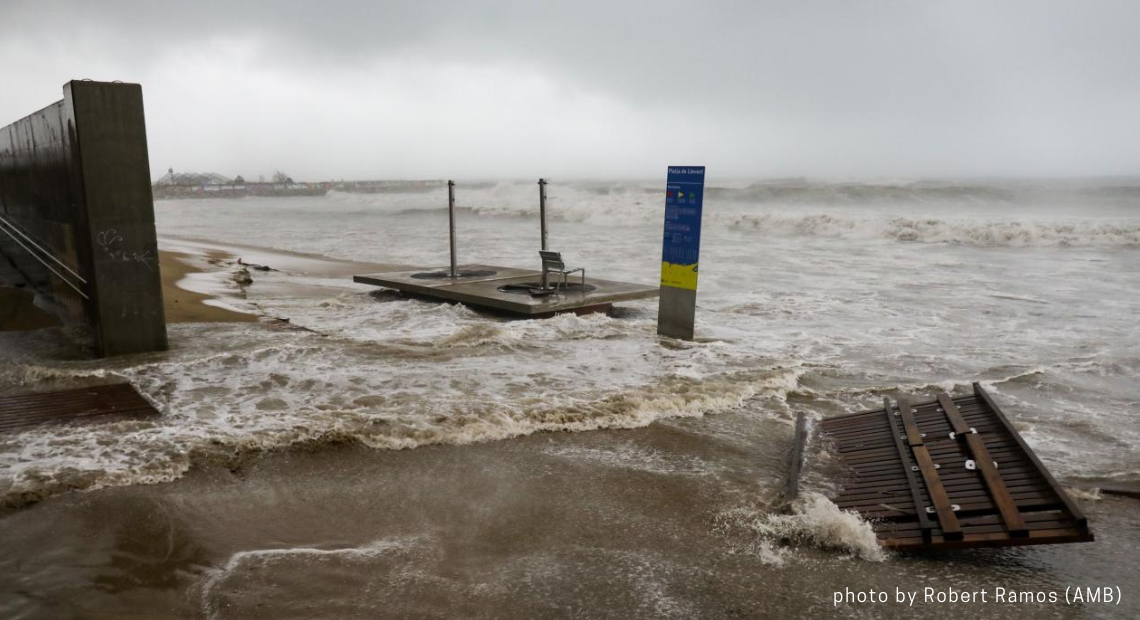In the recent years, the number of disasters caused by climate hazards has increased considerably. According to recent studies by the United Nations, between the years 2000 and 2019, more than 7,000 disasters caused by the climate crisis were recorded, affecting more than 4 billion people and causing an economic loss of nearly $3 trillion worldwide. This increase in damages is mainly due to a significant increase in extreme weather events, such as heat waves, droughts or floods. Looking ahead, if the increase in global temperature remains on the current trajectory and net-zero emissions targets are not met by 2050, the frequency of these catastrophes will continue to increase and around 10% of the world’s economic value could be lost.
In this context, ICARIA, a European project that aims to increase knowledge of the impacts of natural disasters on strategic infrastructures in different sectors such as water, energy and transport, has recently been launched. This initiative also seeks to understand how these events could affect the life-cycle costs of these infrastructures in the coming decades and to ensure that investments are made in adaptation measures to cope with these changes.
Specifically, ICARIA will propose a comprehensive framework for climate resilience and assessment of economic and social impacts. This includes the development and validation of state-of-the-art models capable of simulating risks arising from extreme climate events, as well as the analysis of related climate hazards. The impact assessment will focus on critical and vulnerable assets. On the other hand, cascading effects will focus on strategic services and public and private infrastructures related to the water, transport, energy, housing and environment sectors.
ICARIA will test its solutions in Spain, Greece and Austria
To carry out the research, ICARIA will work on three case studies across Europe. Two of them, the Barcelona Metropolitan Area in Spain and the South Aegean Archipelago in Greece, are located in coastal areas of the Mediterranean, considered a hotspot for receiving more severe extreme weather impacts than the global average and for concentrating more than half of the continent’s population Salzburg, the third region, is located in Austria, an area heavily affected by the climate crisis, with melting glaciers and heat waves directly impacting assets related to energy production and other strategic sectors.
The project will also assess the replicability of the proposed solutions, first among the different case studies and then in five other regions already selected: the Vega Baja region in the Valencian Community in Spain; the South Aegean region and Crete in Greece; the Campania region and the Metropolitan Area of Naples in Italy and the region of Upper Austria. At the end of the project, the territories analyzed will have regional-scale adaptation scenarios with climate and socioeconomic projections to understand the short and long-term impact of the measures they take.
15 entities with experience in the field of research in Europe will collaborate in this initiative
ICARIA is part of the European Commission’s Horizon Europe funding program, and its consortium members have extensive experience in European research projects in the field of urban resilience and critical infrastructure management. Under the leadership of Cetaqua, Water Technology Center, and Aquatec, a company of the Agbar group, the project consortium is formed by the companies Aigües de Barcelona, Draxis Environmental of Greece, and Verbund of Austria; the Metropolitan Area of Barcelona and the South Aegean Region of Greece as public entities; the Foundation for Climate Research (FIC) and the Catalonia Institute for Energy Research (IREC), Spanish research centers, the Demokritos National Center for Scientific Research of Greece, the Centre for Research and Technology Hellas – Information Technologies Institute of Greece, the National Laboratory of Civil Engineering of Portugal, and the Austrian Institute of Technology. From academia, the University of Naples Federico II and the University of Exeter in England are participating.
The Power Systems group at IREC within ICARIA is bringing their expertise on resilience and climate change impact on the electrical sector. This action is led by José Luis Domínguez.
ICARIA follows in the footsteps of previous initiatives such as RESCCUE, a European research project led by Aquatec and completed in 2020. Unlike its predecessor, ICARIA focuses more specifically on modeling and assessing climate impacts on critical infrastructure and their cascading effects on a regional scale, including simultaneous climate hazards such as the occurrence of rainfall and coastal flooding events at the same time or droughts and heat waves coupled with wildfires.
Find the press release in Spanish and English:
Funded by the European Union. Views and opinions expressed are however those of the author(s) only and do not necessarily reflect those of the European Union or European Climate, Infrastructure and Environment Executive Agency (CINEA). Neither the European Union nor the granting authority can be held responsible for them.




